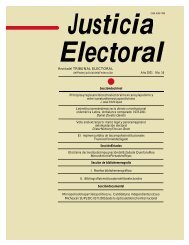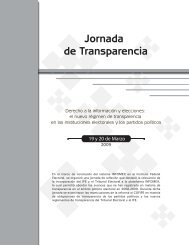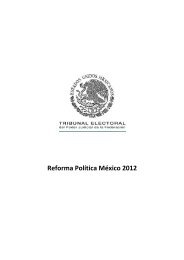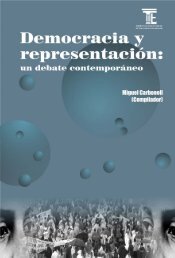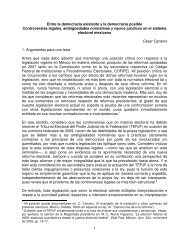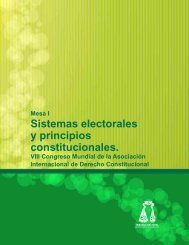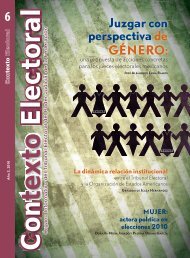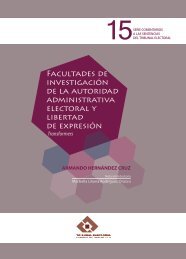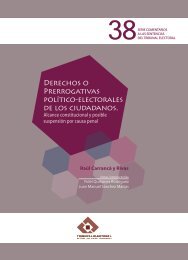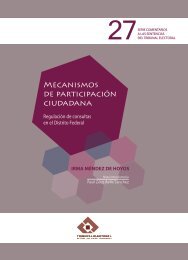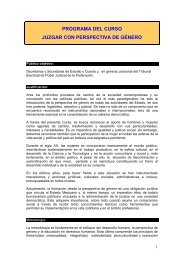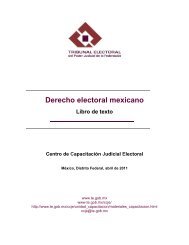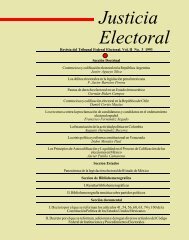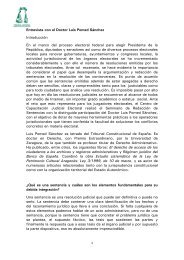La Motivación de la Sentencia Civil - Tribunal Electoral del Poder ...
La Motivación de la Sentencia Civil - Tribunal Electoral del Poder ...
La Motivación de la Sentencia Civil - Tribunal Electoral del Poder ...
Create successful ePaper yourself
Turn your PDF publications into a flip-book with our unique Google optimized e-Paper software.
El problema <strong>de</strong> <strong>la</strong> motivación <strong>de</strong> <strong>la</strong> sentencia civil<br />
<strong>la</strong> opinión que el intérprete tiene sobre el mundo y sobre sus fenómenos, se materializa<br />
con poco esfuerzo el ambicioso proyecto <strong>de</strong> convertir a <strong>la</strong>s opiniones personales en el<br />
marco absoluto <strong>de</strong> lo real, habiendo excluido a priori el riesgo <strong>de</strong> una verificación<br />
intersubjetiva. Sobre ello no vale <strong>la</strong> pena a<strong>la</strong>rgarse; en el fondo, al menos <strong>de</strong>s<strong>de</strong> el punto<br />
<strong>de</strong> vista <strong>de</strong> <strong>la</strong> coherencia interna, el irracionalismo que preten<strong>de</strong> y que quiere serlo es<br />
preferible al irracionalismo que busca presentarse como una forma superior <strong>de</strong><br />
racionalismo.<br />
33 <strong>La</strong> bibliografía <strong>de</strong> <strong>la</strong>s investigaciones realizadas en este sentido en los últimos<br />
años, especialmente en los Estados Unidos, se ha vuelto imponente a tal grado que<br />
resulta imposible hacer una señalización exhaustiva. Debe recordarse, en todo caso, <strong>la</strong><br />
serie <strong>de</strong> estudios realizados por Glendon Schubert, que pue<strong>de</strong> ser consi<strong>de</strong>rado como el<br />
iniciador y <strong>la</strong> personalidad más importante en este campo (<strong>de</strong> SCHUBERT, cfr.<br />
especialmente, Quantitative Analisis of Judicial Behavior, Glencoe, Illinois, 1959; The<br />
Judicial Mind Attitu<strong>de</strong>s and I<strong>de</strong>ologies of Supreme Court Justices 1946-1963, Evanston,<br />
Illinois, 1965; Judicial Policy Making, Glenview, 11965; cfr. también los escritos publicados<br />
en los volúmenes Judicial Decision Making, Nueva York, 1963, pp. 55 y ss., y Judicial<br />
Behavior. A rea<strong>de</strong>r in Theory and Research, Chicago, 1964, pp. 1 y ss. y 548 y ss.). Vale<br />
<strong>la</strong> pena a<strong>de</strong>más seña<strong>la</strong>r como fuentes <strong>de</strong> un marco bastante amplio <strong>de</strong> <strong>la</strong> situación,<br />
algunas otras compi<strong>la</strong>ciones <strong>de</strong> ensayos: NAGEL, The Legal Process from a Behavioral<br />
Perspective, Homewood, Illinois, 1969; SCHUBERT, Judicial Behavior, cit.; GROSSMANN-<br />
TANEHAUS, Frontiers of Judicial Reserarch, Nueva York, 1969; SIMON, The Sociology<br />
of <strong>La</strong>w, San Francisco, 1968; FRIEDMAN-MACAULAY, <strong>La</strong>w and the Behavioral Sciences,<br />
Indianápolis-Kansas City-Nueva York, 1969. Para el perfil más estrictamente metodológico<br />
<strong>de</strong> dichas investigaciones, cfr. KORT, “Content Analisys of Judicial Opinions and Rules of<br />
<strong>La</strong>w”, en, SCHUBERT, Judicial Decision Making, cit., pp. 133 y ss.; id., “Quantitative<br />
Analisys of Fact-Pattern in Cases and their Implications on Judicial Decisions”, en 79,<br />
Harvard <strong>La</strong>w Review,1966, pp. 1595 y ss.; PRITCHETT, “Division of Opinions among<br />
Supreme Court Justices of the U.S. Supreme Court”, en SCHUBERT, Judicial Behavior,<br />
cit., pp. 319 y ss. Cfr. a<strong>de</strong>más, para una visión resumida y para indicaciones ulteriores,<br />
WEISS, op. cit., pp. 86 y ss.<br />
34 <strong>La</strong> construcción <strong>de</strong> este tipo <strong>de</strong> mo<strong>de</strong>los es el primer paso para el p<strong>la</strong>nteamiento<br />
<strong>de</strong> toda investigación empírica sobre <strong>la</strong> <strong>de</strong>cisión. Cfr. al respecto, LAWLOR, “Axioms of<br />
Fact Po<strong>la</strong>rization and Fact-Ranking. Their Role in Stare Decisis”, en 14 Vil<strong>la</strong>nova <strong>La</strong>w<br />
Review, 1969, pp. 703 y ss; id., “Analisys and Prediction of Judicial Decision. Informal<br />
Progress Report”, en M.U.L.L., 1965, pp. 132 y ss.; id., “Fact Content Análisis of Judicial<br />
Opinions” en Jurimetrics J., 1968, p. 107 y ss.; KAPLAN, “Decision Theory and the Factfinding<br />
Process”, en Stanford <strong>La</strong>w Review, 1968, pp. 1065 y ss.<br />
35 Por lo que hace a <strong>la</strong>s investigaciones realizadas en los Estados Unidos, véase<br />
nota 32. En Italia, los estudios sociológicos sobre los jueces en los últimos años<br />
comenzaron a tener una consistencia apreciable: cfr. PAGANI, <strong>La</strong> professione <strong>de</strong>l giudice,<br />
Milán-Varese, 1969; DI FEDERICO, Il reclutamento <strong>de</strong>i magistrati, Bari, 1968; MORIONDO,<br />
L’i<strong>de</strong>ologia <strong>de</strong>l<strong>la</strong> magistratura italiana, Bari, 1967; cfr. a<strong>de</strong>más sobre estos estudios, <strong>la</strong>s<br />
observaciones <strong>de</strong> Renato TREVES, Giustizia e giudici nel<strong>la</strong> società italiana, Bari, 1972,<br />
pp. 39 y ss; id., “L’amministrazione <strong>de</strong>l<strong>la</strong> giustizia in Italia. Bi<strong>la</strong>ncio di una indagine”, e<br />
Rivista di diritto processuale, 1972, pp. 87 y ss. Para <strong>la</strong>s investigaciones sociológicas<br />
realizadas sobre los jueces en Alemania, cfr. DAHRENDORF, “Deutsche Richter. Ein<br />
Beitrag zur Soziologie <strong>de</strong>r Oberschicht”, en Gesellschaft und Freiheit, Münich, 1961,<br />
pp. 176 y ss; id., “Zur Soziologie <strong>de</strong>s Richters”, en Deutsche Richterzeit, 1965, pp. 41<br />
47



